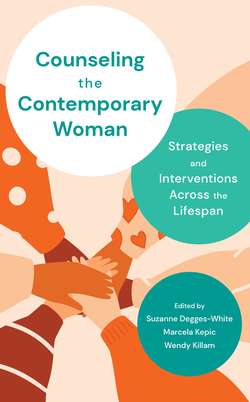Читать книгу Counseling the Contemporary Woman - Suzanne Degges-White - Страница 125
На сайте Литреса книга снята с продажи.
Family Relationship Changes
ОглавлениеMidlife is a time when relationship roles and boundaries take on more of an elastic nature as new people move into the circle and others move out. The traditional trajectory of a woman’s life was to go from youth to bride to parent to grandparent. Although these transitions are considered part of the normal cycle of life, the transition from parent to grandparent or mom to “mom-in-law” can bring emotional challenges that may be unexpected. Some clients may welcome these new roles, while others may feel that their place in their children’s lives is being usurped by their children’s partners or in-laws. Grandparenthood—or longing for it but not having it occur—may challenge some individuals as well. Every individual responds differently to life events and “nonevents.”
Some women have difficulty letting go of their children and wrestle with the “empty nest” that is often faced at midlife. This period can be a time of bereavement as the primacy of the role of mother may shrink in size. If married, some women may feel that their partners are strangers—this is common when childrearing has been the focus for the past couple of decades. Encourage clients to reacquaint themselves with their partners through “dates” or shared activities. Invite clients to explore hobbies or interests that were “put on the shelf” once their children arrived on the scene.
Other family roles that can cause upset include clients becoming the mother-in-law to disliked spouses of their children. Some women resent a child’s changing allegiance from their parents to their partner. If your client is having difficulty accepting a child’s partner, invite your client to discuss her concerns as well as her fears about the changing relationship with her child. Encourage her to reflect on how her relationship to her own mother changed when she became half of a couple herself. Enlarging a client’s perspective on the transition as well as helping her expand her own vision of what “family” means as children grow up can help her shift her beliefs and decrease her distress.
The role of grandmother can be difficult for some women as they feel that this transition is a further marker of advancing age. Validate your client’s fears and normalize her concerns by noting the wide range of feelings that entry into grandparenthood can bring. Help your client brainstorm the positive aspects to grandparenting and ways she might be different with the grandchild than she was with her own children.
Wanting to be a grandparent, but not getting that opportunity, can also be distressing for some clients. The “fear of missing out” may be especially strong if your client’s social support system is peopled with friends who are already grandmothers. Again, normalize your client’s feelings and then encourage her to share ways she might be able to fill the time she “thought” might be taken up by the grandmother role.
Although research suggests that women no longer feel the need to conform to specific timelines for transitions (Degges-White & Myers, 2006), any transition has the potential to create difficulties that motivate a woman to seek a counselor’s support. Counselors working with midlife women should avoid preconceived notions about what midlife “used to” or “should” look like, as the experience is unique to each individual woman.
